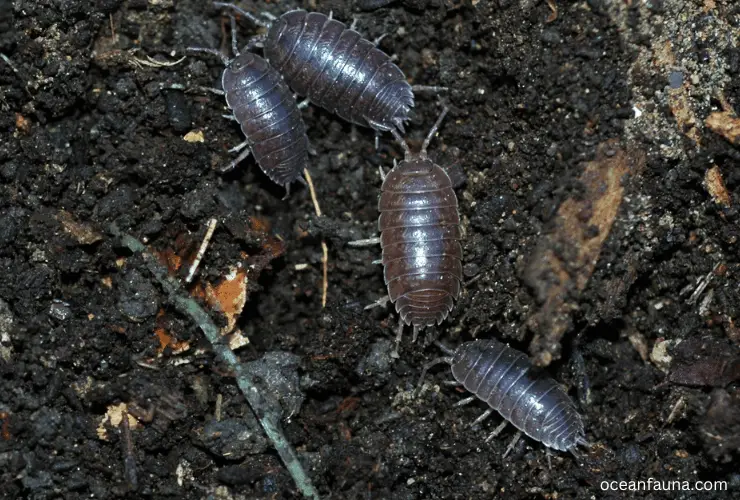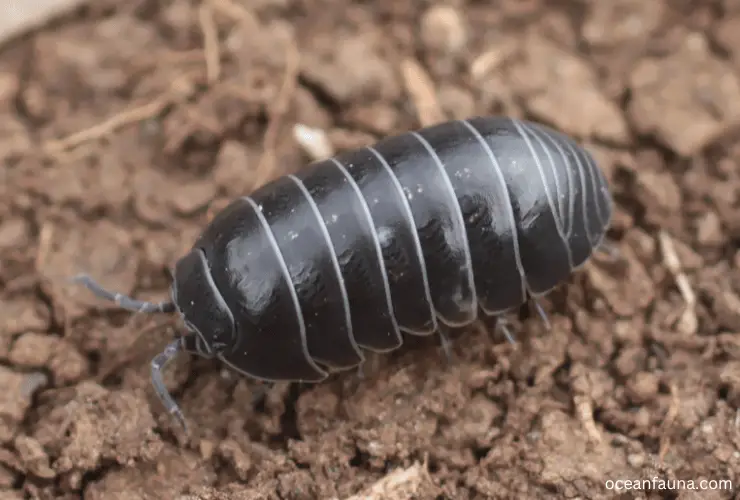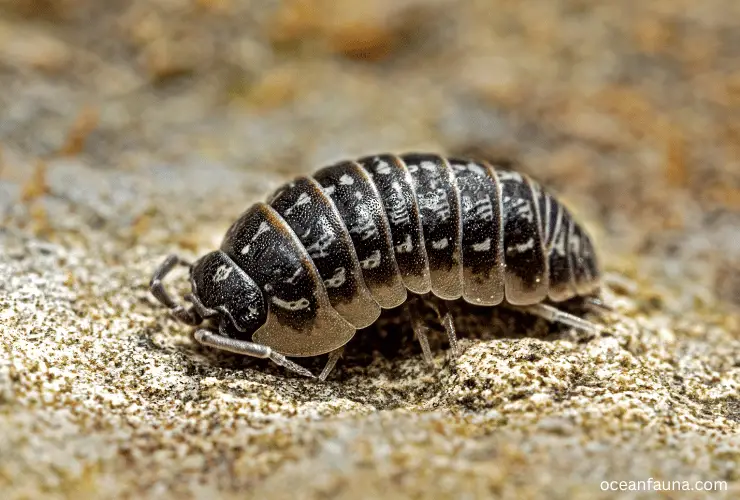A lot of people want to keep isopods as pets or cultivate them commercially. For them, it’s important to know the biting behaviours of isopods. And a lot of people have been wondering whether isopods are dangerous or not. Also, they have got questions like, do isopods bite?
Yes, isopods do bite! Among the isopods, marine or aquatic isopods bite as they are known to capture prey or food. But in the case of terrestrial ones, they don’t bite, and they aren’t even dangerous. They are scavengers and depend on eating organic materials. On top of that, they aren’t aggressive at all and friendly!
So, if you’re one of those who are eager to know whether isopods bite or not, this guide is definitely for you. So, keep reading and discover some amazing facts regarding the biting behaviours of these tiny little creatures.
Do Isopods Have Teeth?
Yes, isopods have teeth. These tiny creatures have tiny teeth that help them to catch prey and tear down their food.
They mainly use the tiny little teeth of the isopods for intaking food. Other than that, they don’t use them either to bite or to harm others.
Among the isopods, giant isopods have the biggest and strongest teeth. They also use it to capture prey and break down the good hard particles.
Although isopods have teeth and the giant ones have the strongest biting force, this has nearly zero impact on humans and animals. The biting force is more on giant isopods compared to the tiny ones. But overall, the bite might feel like a little prick from a pin or any sharp object; that’s it!
Do Isopods Bite?
There are more than 10,000 species of Isopods. Among them, the majority are terrestrial, and only a handful are aquatic or marine. As there are different types of isopods, their behaviour differs as well.
Do isopods bite? Well, some do, whereas some don’t!
Among the isopods, marine or aquatic isopods live underwater. As there is a scarcity of food, they use their claws and legs to capture prey. They are a little bit aggressive, and their main food is tiny marine creatures.

On the other hand, the case for terrestrial isopods is completely opposite. Although the tiny little creatures look dangerous or harmful to the naked eye, they pose no danger to humans or animals.
The reason? Well, it’s mainly due to their diet and food habits! So that’s why they aren’t dangerous, and the terrestrial ones don’t bite as well!
But is that it? Well, absolutely not. Let’s dive deeper into this matter and find out the main reasons behind these types of behaviours from terrestrial and aquatic isopods!
Do Terrestrial Isopods Bite?
Among the 10,000 species of isopods, the majority of them are terrestrial or live on land. Among the terrestrial isopods, roly polys, pillbugs, and woodlice are the most notable ones. And they don’t bite!
Although the physical attributes and characteristics of marine and terrestrial isopods are almost the same, the question is, why does one bite whereas the other doesn’t?
Also Read: Rubber Ducky Isopod: Size, Habitat, and Facts
Well, this change or difference in behaviour is mainly due to the feeding habit or diet. The main diet of isopods living on lands is decomposed plants, dead wooden blocks, decomposed animal, and organic bodies, etc.
If you look carefully, these materials or foods for isopods are typically soft and easily eatable. So due to this feeding habit and food, the land isopods weren’t generically developed to eat or consume tough materials.
And as they weren’t made to eat tough or hard materials, that’s why they don’t bite, and they are not dangerous to humans at all!
Moreover, isopods don’t even fight back, even in danger. They have different ways of responding to threats. If isopods feel any danger or threat, instead of biting or stinging, they curl their body and take the shape of a tight ball.
Although they don’t bite or attack even in danger, they’ve sharp claws and segmented bodies. So, you might hurt yourself on the way of picking them up or capturing them. We’ll discuss this in the latter part. So, keep reading!
Do Marine Isopods Bite?
The biting behaviour of marine isopods is quite the opposite of their landlocked relatives. While the terrestrial ones are harmless and friendly, marine isopods are scavengers, omnivores, and herbivores and bite as well!
The diet and food habits of aquatic isopods are algae, dead animal matter, and tiny marine creatures that live under and around rocks. As there is food scarcity in the water compared to land, marine isopods are always searching for food.
As they needed to hunt down tiny organisms, their mouths were designed in such a way that they could chew and break down organic materials.
Both terrestrial and marine isopods live in groups. Another common thing between them is that when they find a dead body, they quickly attack it in groups and clean the whole thing, only keeping the skeleton behind.
Reading this far, you might already conclude that marine or aquatic isopods are aggressive. But in reality, the tiny aquatic creatures are not at all aggressive. They are not even hunters. Yes, they can bite, but they pose no harm to humans.
Giant Isopods Are the Strongest Bitters
Giant isopods are the largest among all isopods. And they mainly live on the water. Hence, they fall under marine isopods.
Giant isopods show the behaviours of carnivorous scavengers. Their main foods are the decomposing carcasses of marine creatures.
Although giant isopods are the largest among the isopods, they still feed on small and slow-moving tiny marine fishes and organisms. However, they have strong biting power, and there’s a reason behind this as well!
Unlike other isopods, giant isopods have four powerful jaws. Alongside the strong jaws, they’ve sharp teeth. And this gives them an added advantage in tearing down their prey.
Although giant isopods are the strongest among all the isopods, a bite on a human or animal is still of minimal power.
So giant isopods have the strongest biting powers indeed, but if you compare it to the normal force, they will do little to no harm to humans and others.
Can Isopods Harm Humans?
Although isopods have small teeth and some bite (marine isopods), they’re still not harmful to humans.
Isopods have numerous shapes, claws, segmented body structures, and teeth. Although it might sound dangerous, they don’t use it to bite or harm humans. They mainly use the claws to grab the surface for overcoming obstacles and the teeths to break down food materials.
Surprisingly, they won’t fight back even if you try to attack isopods. Instead, they’ll convert themselves into a circle and use the hard outer shell as an act of defence.

However, as isopods have sharp claws and teeth, there’s a chance of getting hurt by them. But it’d only occur when you try to lift them up or trap them in captivity.
The sharp claws and the teeth might give a nasty nip if you aren’t careful enough. So be careful while dealing with isopods.
Our suggestions would be to wear safety gloves while you pick them up or capture them in a container!
Are Isopods Hostile?
Isopods are not at all aggressive. The tiny little bugs always keep themselves away from human habitats and possible threats.
Isopods always play a defensive role. No matter what the situation is, they always remain calm. When in danger, the first thing that they do is roll themselves up in a small circle and use their outer shell as a shield.
As isopods aren’t dangerous, they can be easily handled by humans. Even if they are attacked first, isopods don’t counterattack.
Due to their calmness and friendliness, isopods have become popular pets. Besides keeping them as pets, people have now started to cultivate them commercially due to their positive impact on the environment and demand in the local market. On top of that, they have fantastic taste, like shrimp and crabs too!
Are Isopods Friendly?
Due to their food habits and behaviours, isopods are known as detritivores. As isopods live on consuming decaying organic matter, that’s why they are known as detritivores.
So, the question is, how is being friendly connected with detritivores?
Well, as the food habits of isopods are decaying materials, they usually do;t have to fight for food. So that makes them calm and friendly.
Besides, isopods live in groups. When detached from their groups, their lifespan decreases drastically.
So living in groups makes them less ferocious and friendly.
Isopods can live in captivity as well. So, when they’re picked up from nature and kept in captivity, they show no danger, nor do they attack people.
Due to their friendliness and food habits, people have become more eager to keep them as pets.
FAQ
Are Isopod Bites Poisonous?
Ans: No, isopods are not poisonous. Whether it’s aquatic isopods or terrestrial isopods, they don’t sting or bite in most cases. Instead, they are found here and there in the environment, even in the garden. Although marine isopods bite, they still they aren’t poisonous.
Do aquatic isopods attack divers?
Ans: It’s possible, but the chance of happening is very, very low. Marine isopods hunt down prey for their food. Besides, they move in groups; their main target is slow-moving aquatic fishes. So, there’s less chance of divers getting attacked by marine isopods.
Conclusion
So that’s all about knowing about the biting behaviours of the tiny little isopods.
If we summarise the whole thing, both terrestrial and aquatic isopods are friendly and non-aggressive. However, due to the difference in food habits, the biting behaviour differs a little bit.
Terrestrial isopods are more friendly. They don’t bite or hunt down prey as they mainly live on eating dead organic materials. Besides, they pose no threats to humans as well.
On the other hand, marine isopods levies by hunting down tiny fishes. That’s why they use their teeth and claws for hunting them. And yes, they bite!
So that’s it. Do isopods bite? I guess you’ve got your answer. So, in case you want to keep them as pets, you can keep them as they’re friendly, not aggressive and poisonous. Thank you!


1 thought on “Do Isopods Bite? [Are They Dangerous?]”